What Sustainable Floristry Looks Like in Our Studio
Just this past week I got a call from a florist just outside of New York City, who was interested in learning about how we manage compost in the studio. Specifically, she was interested in what type of container we use. I loved receiving that call - especially the specificity in the question:) It really excites me when I learn about other businesses that are looking to make changes in their practices to lessen their impact on the environment.
I haven’t written lately about the various sustainable practices we use or the reasons behind them. Feels like a good time to review!
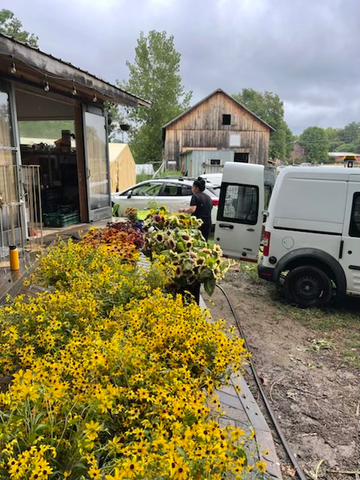
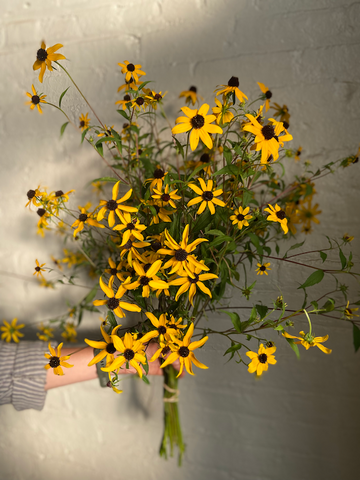
Why we source locally-grown flowers: The Carbon Footprint of a Bouquet of Flowers
I recently ordered the updated 2022 edition of ‘The Carbon Footprint of Everything,’ by Mike Berners-Lee, a globally-recognized expert in carbon footprinting. I was newly astounded as I took in Berners-Lee’s research and summation of the impact of industrially grown flowers:
0 CO2 emissions: Picked from your garden, no inorganic fertilizer
1.7 kg (3.7 lbs) CO2 emissions: bouquet of 15 mixed stems grown outdoors and sold locally
32.3 kg (71 lbs) CO2 emissions: bouquet of 5 hothoused roses, 5 air freighted lilies, and 3 air freighted baby’s breath
> A bouquet a week of imported flowers could add a ton-and-a-half of CO2 per year.
The numbers above for a bouquet of imported flowers are almost the most shocking in this whole book. Out-of-season cut flowers are some of the products with the largest carbon footprint per dollar generated at the checkout.”
While I don’t have any scientific data around the carbon footprint of the bouquets we send out weekly in our subscriptions, it’s safe to assume that their CO2 footprint is lower than those you find at a grocery store, bodega, or conventional florist’s shop. 80% of the flowers purchased in the US today are grown (and air freighted) from distant countries: mainly Ecuador, Colombia, South Africa, the Netherlands.
Pesticide-free flowers: Better for the growers and the consumer
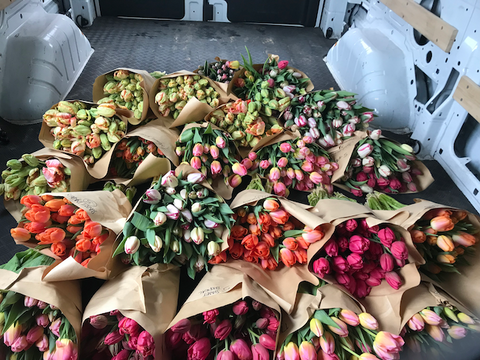
We purchase flowers from ~30 growers who farm within 200 miles of NYC. Most of our growers follow organic standards, and some would argue they go beyond the baseline requirements of USDA organic certification. Most flower growers avoid certification due to the added time and expense. Our growers are all proud stewards of soil. They understand the potential for positive impact in their given ecosystem if they farm with regenerative methods: using organic fertilizers (like compost); avoiding pesticides and herbicides; planting a diversity of crops in order to invite a rich array of pollinators, suppress vulnerability to disease that monocultures face, and to spread out the impact on nutrient reserves in the soil; planting cover crops in winter; and using low-tillage methods during the growing season . Ultimately, developing a soil health-based approach means longterm ecological health, robust crops, and the building rather than loss of organic matter. Building organic matter in the soil is literally the antidote to loss of carbon through off-gassing.
Composting our Flower Waste Locally!
Once we have flowers in hand from our growers, we begin processing. Processing flowers usually entails removing the rubber bands around each bunch (10 stems is standard) – we save and reuse these. Next we will strip lower leaves from the stems, along with any damaged or diseased leaves. Then, we’ll trim off the bottom ½” , giving the stem clean and open vessels to drink water from.
All of these trimmings fall into re-purposed cardboard floral boxes we pick up at the 28th St. Wholesale Flower District.
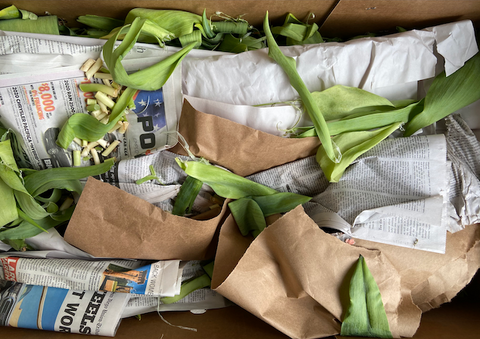
Each week, we process an average of 300 bunches of flowers (3000 stems), which creates anywhere from 40 - 80 lbs of compostable waste.
This collection of organic residues reduces the amount of waste we send to the trash – and therefore to landfills. Landfills cause a huge amount of CO2 and methane off-gassing, contributing to global warming.
Better yet, the trimmings we collect are not coated in pesticides as most industrially grown flowers are – which is important to the urban rooftop farm we send it to, Brooklyn Grange. While a large professional composting facility may be able to accept industrial floral waste and process the compost ‘hot’ enough to burn off any pesticides or herbicides, local operations like Brooklyn Grange would prefer to keep the ingredients added to their compost clean.
Lucky for us, The Brooklyn Grange is located just 5 minutes up the road from us in Sunset Park, making our drop off trip fairly low emissions-wise as well.
Zero Waste Packaging + Branding
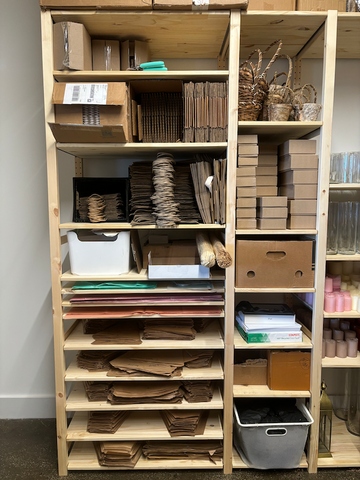

When we began offering subscriptions, I knew I wanted to package our flowers in the most eco-friendly way possible. Aside from the upcycled rubber bands, we work with 100% recycled paper Kraft sleeves to contain and ship our bouquets. Kraft paper is both recyclable and compostable - give our customers the option to dispose of your sleeve in one of two eco friendly ways.
We stamp all of our sleeves, and we use Green Link water-based ink, and a self-inking stamp made from recycled plastic!
Our “special order” vase arrangements also go out in 100% recycled Kraft paper, and we also use a touch of No Issue compostable tissue paper, and compostable Raffia as final touches. All compostable, all recyclable.
Working with Terracycle to UpCycle the Unrecyclable!
New York City’s municipal recycling program cannot accept all forms of plastic - especially the super soft, one-use plastics often used as floral sleeves in the flower distric, and even by some farmers. Fortunately the New Jersey-based company Terracycle created a one-stream solution. We have been using their “Zero Waste Bin” since 2019. Terracycle takes this waste, sorts it, and upcycles it into useful things like park benches, kitchen counter compost bins and more!
Ultimately, between composting and Terracycling, we send relatively little waste to landfill on a weekly basis.
Foam Free Alternatives and Other Sustainable ‘Mechanics’
“Mechanics” - an industry term - refers to tools and materials that help hold designs in place, in shipping and on site for events. For decades, Oasis “floral foam” has been the product of choice of most florists; it can hold up to 50 times its weight in water, and cut stems can draw hydration from the foam they are designed into.
However, floral foam is made with two petrochemicals, which have been linked to cancer: phenol and formaldehyde. Leached foam residues and chemicals have been found in waterways, and found in the bodies of aqautic microorganisms as a result. Oasis foam can and should only be sent to landfill - even the version of foam they now produce they claim is more environmentally friendly. (Read more on this at SustainableFloristry.org.)
At MOF, we stick with the basics: clean water, clean vases, and renewable, compostable, or reusable mechanics.
For event work, when we need extra support in our designs, we will use “Oshun” pouches (a new, eco-friendly compostable alternative made from renewable plant based ingredients), reusable chicken wire and/or floral “frogs.”
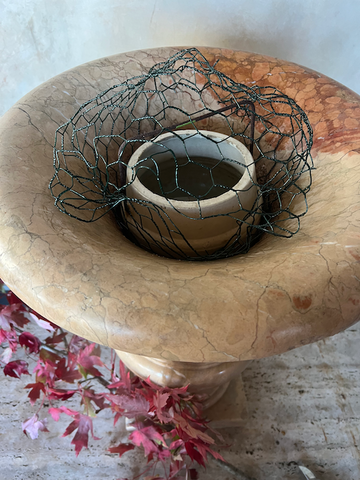
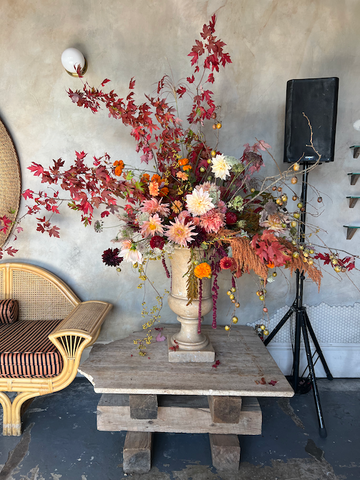
We recommend that our subscription members change out water and recut stems at home once every couple of days.
We never use synthetic sprays, dyes, or holding solutions.
Paraffin-free Candles, Natural Dyed Ribbon and Other Sustainable Sourcing
Candles - especially votive candles - are a small, but abundant item at an event. Most of our events command 100 - 300 candles, between votives and tapers. About half of our ~50 events call for candles – so on average, we’re using 5,000+ candles a year. And we are just one florist of many in our city!
For all events, we use paraffin-free votive and pillar candles from GoodLight candles. Goodlight candles do not contain phthalates, or any synthetic or artificial fragrances. Their candles are made from responsibly sourced palm oil instead. In other words, palm oil harvested from sustainably grown palm trees – in which no rainforest was destroyed. GoodLight uses cotton wicks, also good for the environment!
We also use 100% Beeswax candles from Beehive Alchemy in Wisconsin. Beeswax is the most environmentally friendly option for candle wax.
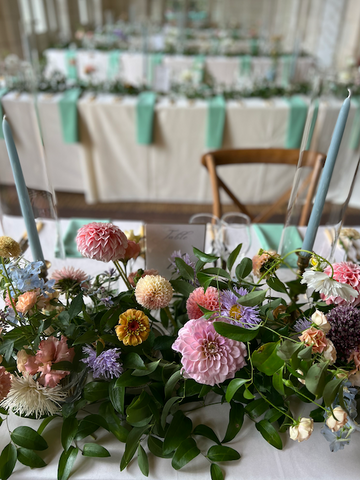
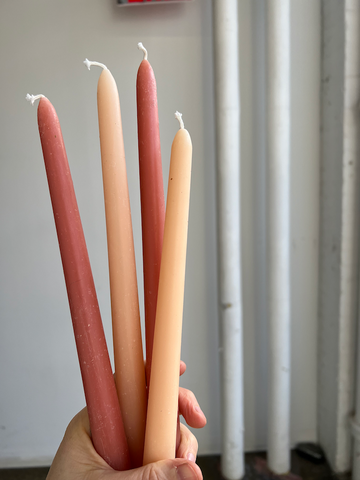
Ribbon is another material used often for weddings. We love sourcing naturally-dyed silk ribbon from Silk and Willow. It’s 100% compostable, and so beautiful!
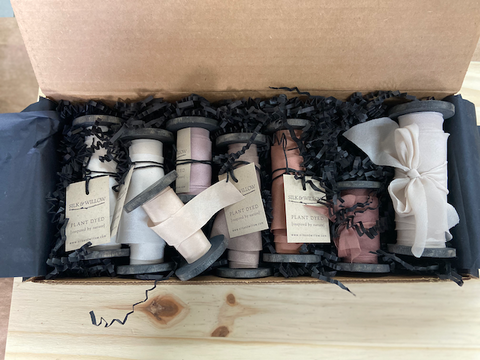
Beyond the Basics: Thinking About Long Term Community Wellness
For me, any definition of sustainability needs to go beyond the small actions (which certainly can add up to big impact) that will benefit our environment. A definition of sustainability needs to incorporate the holistic wellness of people. And wellness for me means being able to live a healthful life in all aspects: access to good food, clean air and water, safe housing, affordable education, and access to green space and nature.
Currently, farming remains one of the whitest professions in our country. Access to land for people of color has been systemically limited due to our history of slavery followed by Jim Crow and eventually redlining in housing. This means that access to space, to nature, remains a privilege. Farming, and working with soil and plants became tainted for many.
Farming in general is a very resource/capital investment - heavy profession; if you do not have generational wealth, or land, it may be completely out of reach.
We donate 15% of profits from our subscription program to organizations that are working on pushing for equity in land access and farming support. These organizations, like the Black Farmer Fund and Black Flower Farmers, are dedicated to increasing the number of farmers of color in the US. We also donate directly to single businesses, run by people of color. This is our small way of contributing towards one often overlooked but vital aspect of sustainability and wellness.
